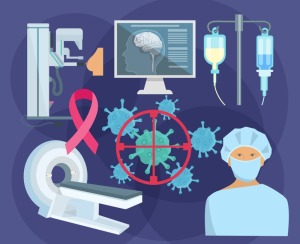por
Lauren Dubinsky, Senior Reporter | May 31, 2017

Research to be presented
at ASCO annual meeting
Many asymptomatic women who were treated for early-stage breast cancer undergo unnecessary advanced imaging exams and tumor-marker tests while under surveillance.
Those were the findings of a new study to be presented next week at the American Society of Clinical Oncology annual meeting.
ASCO’s
Choose Wisely guidelines, which were first published in April 2012, recommended against the use of surveillance testing or PET, CT and radionuclide bone scans on asymptomatic individuals who have been treated for breast cancer.



Ad Statistics
Times Displayed: 16169
Times Visited: 33 Final days to save an extra 10% on Imaging, Ultrasound, and Biomed parts web prices.* Unlimited use now through September 30 with code AANIV10 (*certain restrictions apply)
The association backed their recommendation by stating several studies have shown that routine imaging and serial measurement of serum tumor markers has no benefit for this patient population. False-positive exams can lead to unnecessary invasive procedures and radiation exposure, overtreatment and misdiagnosis.
"Imaging with PET, CT or radionuclide bone scans can be useful in the staging of specific cancer types," Dr. Gary Lyman, study leader and co-director of the Hutchinson Institute for Cancer Outcomes Research, told HCB News. "However, these tests are often used in the staging evaluation of low-risk cancers, despite a lack of evidence suggesting they improve detection of metastatic disease or survival."
Lyman and his colleagues at Fred Hutchinson Cancer Research Center evaluated the records of 2,193 early-stage breast cancer patients and found that 37 percent received tumor-marker tests and 17 percent received advanced imaging during the post-treatment surveillance period.
The cost to care for those patients during the surveillance period was substantially higher than the average cost of $18,403 to care for all of the patients. In addition, the patients who received advanced procedures visited their physicians an average of 13.3 times.
Lyman stated that oncologists need to be better informed about the lack of benefit that these tests bring to this asymptomatic group of patients. That could, in turn, help patients lighten their financial burden.
Lyman disclosed that he provides consulting services to biotechnology companies G1 Therapeutics and Halozyme, and received research funding from Amgen. The co-authors identified their relationships
in the abstract.
The
poster presentation, “Patterns in provider types and cost of surveillance testing in early-stage breast cancer patients: a regional study,” will be held on June 5 at 1:15 p.m. at the ASCO meeting in Chicago. The study was published in the
Journal of Clinical Oncology.

